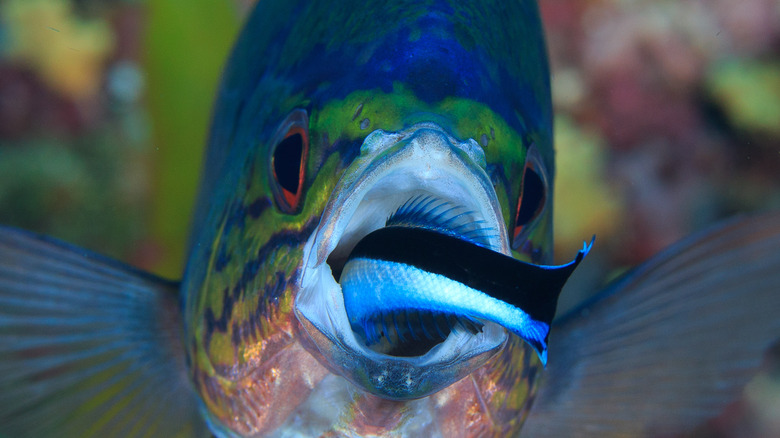Here's What Makes Cymothoa Exigua So Scary
Something's fishy in our water, and it's causing quite the stir, but it isn't a colossal toothy shark or a legendary sea monster — it's an itty-bitty parasite about the size of a fish's tongue. Scientists don't ordinarily measure parasites in units of fish tongue, but Cymothoa exigua is unique in size and utility, making this measurement quite accurate.
It would be difficult, if not impossible, to perceive something more nightmarish emerging from the ocean's depths. That is really saying something, considering the fact that the ocean is absolutely swimming with frightful maritime monsters, from the ghoulish-looking frilled shark to the bottom-dwelling goblin. Yet even amid vampire squids and color-changing octopuses, this parasite leaves a chilling impression. And according to Futurism, this deep-sea swimming louse is currently the only organism known to man that can effectively replace an entire bodily organ. At this point, you might be wondering what a parasite could replace an entire organ with. The answer is itself, and that's exactly what makes Cymothoa exigua so scary.
Cymothoa exigua eats and then becomes a fish tongue
In a style reminiscent of the Big Bad Wolf versus poor granny, Cymothoa exigua eats its victim's tongue and then parades around in the fish's mouth pretending to be the tongue it just ate (via PBS). Is this crafty parasite fooling anyone? Well, take a look at the cover photo again, because there it is, inside the mouth of an Anemone.
This haunting procedure begins in the gills, where the parasite first nestles and waits (via Futurism). Over a course of time, the parasite matures and transitions, first from male to female and then again from gill to tongue. Shockingly or sadly, depending on how you view this routine, the fish does not die. Rather, it lives on with a living prosthetic tongue.
The odd symbiotic relationship between fish and parasite continues, and more parasites gather in the fish's gills. The parasites in the gills are male, and the parasite pretending to be the tongue has now transformed into a female. In a horrifying turn of events, male and female parasites now perform coitus in the victim fish's mouth, and baby parasites are spawned as a result. This cycle goes on for the duration of the victim's life.

